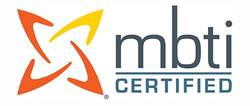
MBTI
The Myers-Briggs Type Indicator is based on Carl Jung’s theory on psychological types. The basic concept is that each individual is guided by certain natural preferences. Understanding the typology provides insight into one’s own and others’ preferences, and the associated strengths and possible pitfalls.
The MBTI organises these personality preferences into 4 dimensions, in which each dimension contains two opposing preferences, the so-called dichotomies:
- Extraversion (E) or Introversion (I) : what do you focus your attention on? What energises you?
- Sensing (S) or Intuition (N) : in what way do you absorb information?
- Thinking (T) or Feeling (F): how do you structure information? How do you make decisions?
- Judging (J) or Perceiving (P): how do you deal with the outside world? What is your lifestyle?
These preferences are fundamentally different from skills or abilities in the sense that all preferences are equally important and valuable, and that each person can and will also use all other preferences. We will, however, use our personal preferences more easily, almost automatically, while it requires more concentration and energy to use our non-personal preferences. Understanding the typology provides insight into one’s own and others’ preferences, and the associated strengths and possible pitfalls.
Working with MBTI helps teams to...
- come to a better understanding of how they and others function at a personal level.
- appreciate others and make constructive use of the differences.
- tackle problems in a different manner, and increase productivity as a result.
- align responsibilities and match tasks better to individuals.
- understand how different perspectives and styles can lead to more effective leadership.
- obtain insight into the prevailing communication styles and recognise opportunities for improvement.
Stanwick has several experienced consultants who are certified to work with the MBTI tool, both for individual processes and for team sessions.





